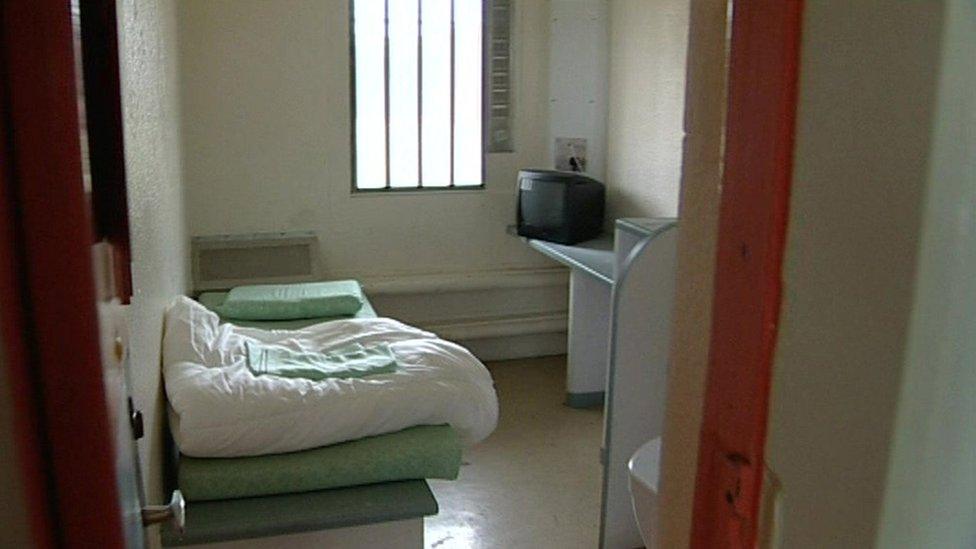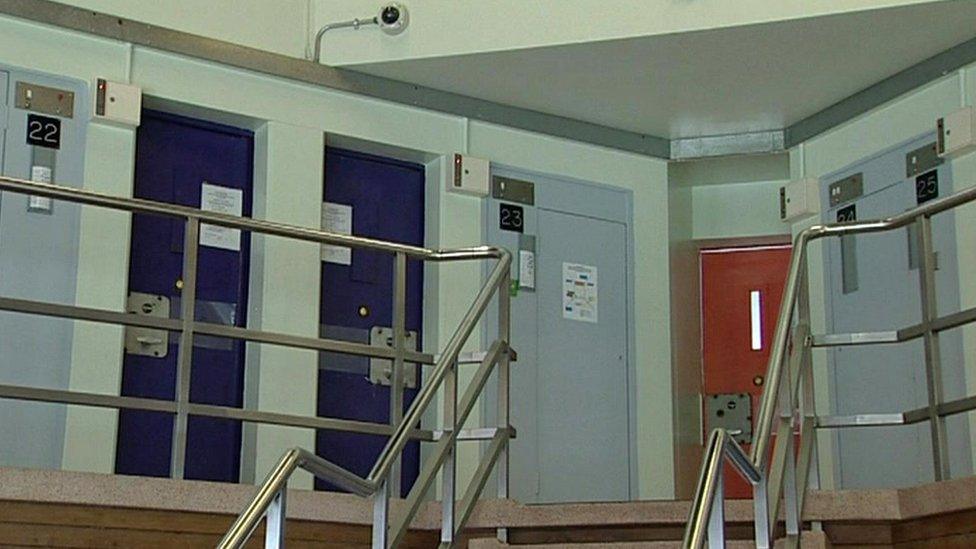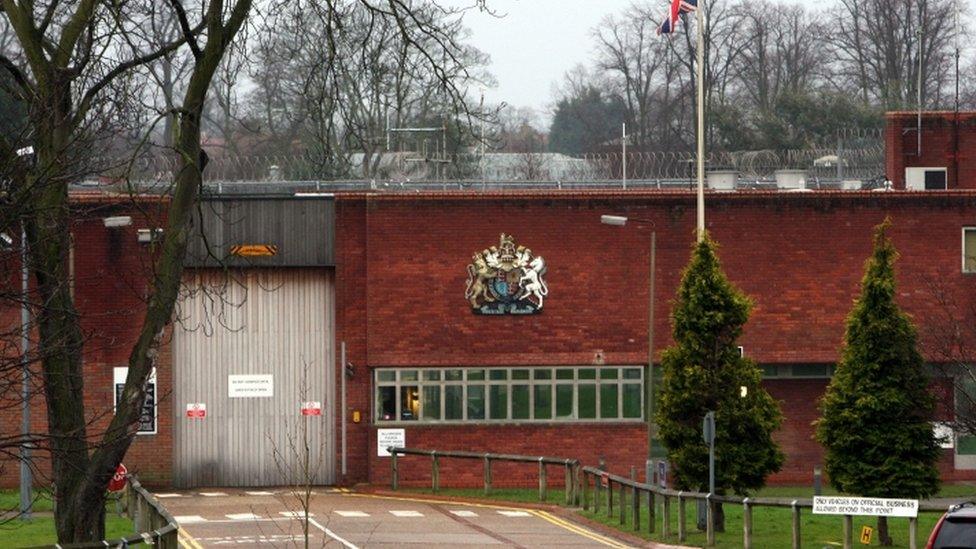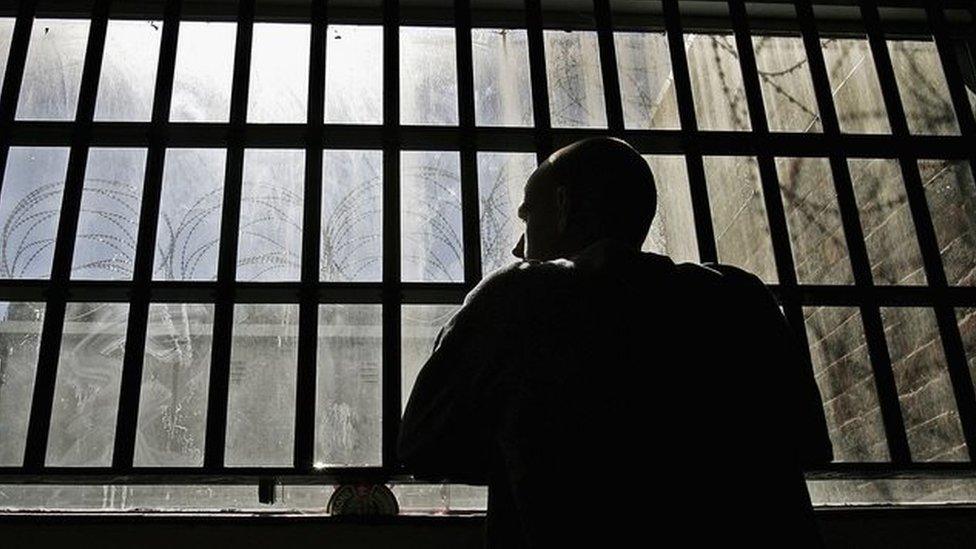Temporary ban place on new inmates to troubled Feltham youth jail
- Published

Feltham A holds just over 100 15 to 18-year-olds
Inmates are no longer being sent to a young offenders institution (YOI), after a watchdog's inspection revealed an "extraordinary" decline in safety and care.
The chief inspector of prisons has demanded immediate improvements, external at Feltham A YOI in west London.
As a result he triggered the "urgent notification" process, giving the government 28 days to respond.
Previously only five adult prisons had triggered this process.
These prisons were Bedford, Nottingham, Birmingham, Bristol and Exeter.
The latest inspection of Feltham A found there were very high levels of violence between boys and against staff, a high use of staff force, poor care, long periods of cell lock-up and escalating self-harm.
Feltham A, which holds just over 100 15 to 18-year-olds, "has for many years been recognised as a challenging and complicated establishment", chief inspector of prisons Peter Clarke said.
"We found that, in the six months since the last inspection, there had been what can only be described as a collapse in performance and outcomes for the children being held in Feltham A.
"The speed of this decline has been extraordinary."
Speaking on Radio 4's Today programme, Mr Clarke added: "I don't minimise for a moment that some of them have committed very serious offences, and some of them are very, very challenging indeed, but the fact is they are still children."
Justice minister Edward Argar said the report was "deeply disappointing and concerning" and the government would respond with a formal action plan within 28 days.
He said the decision to stop sending young people to Feltham A was made to provide space for staff to make improvements.

Analysis
by Danny Shaw, Home Affairs Correspondent
The alarming decline in standards at Feltham A appears, in part, to reflect the growing difficulty of coping with an increasingly violent and vulnerable population.
Although the number of boys has fallen, from 148 in January to 108 at the latest inspection, those who remain are among the most challenging - on remand for, or convicted of, the gravest offences.
Many will have been perpetrators of serious violence or knife crime. The gang allegiances and criminal behaviour they displayed on the streets won't automatically get left behind at the gates of the prison.
However, a report on Wetherby Young Offender Institution in Yorkshire, published this week, shows there is a way of successfully managing troubled young people.
Inspectors found that the centre, which holds 250 15- to 18-year-olds, including 48 on a specialist unit, was well-led, had lower levels of violence than elsewhere and was delivering "good outcomes" for the boys held there.

In a letter to Justice Secretary David Gauke, Mr Clarke said 40% of boys at the unit told inspectors they had felt unsafe at some point, while:
almost three-quarters reported having been physically restrained
fewer than one in five felt cared for by staff
a third said they were allowed out of their cells for fewer than two hours on weekdays, rising to almost three-quarters at weekends
Resources were being wasted as healthcare staff, education facilities and resettlement intervention services stood idle waiting for children to arrive, said the report.
It also found children being released without stable accommodation, without education, training or employment in place and without support from family or friends.

Feltham A manages young people on remand and those who have been sentenced by the courts
"The atmosphere feels tense. I could sense that many staff were anxious," Mr Clarke said.
"Some were clearly frustrated about the situation in which they found themselves. They wanted to do their best for the children in their care."
Mr Clarke said Feltham A had for many years focused too heavily on containing problems rather than addressing them.
"'Keep apart' policies, developed so that children from rival gangs, or who for other reasons are likely to be violent to each other, are kept separate, have come to dominate.
"This has led to a collapse of any reasonable regime, has prevented many children from getting to education or training, delayed their access to health care, isolated them from meaningful human interaction and frustrated them to the point where violence and self-harm have become the means to express themselves or gain attention.
"There clearly needs to be a new approach which looks fundamentally to change behaviour and goes beyond merely trying to contain violence through ever more restrictive security and separation."
Despite efforts from staff and substantial support and resources from the government, Mr Argar said underlying challenges remained at Feltham A and progress needed to be quicker.
He said the government had appointed additional, experienced management staff and refurbishment would also be taking place.
"The governor, who is still relatively new in post, is working hard to drive improvement in an establishment which has one of the highest and most concentrated proportions of violent offenders in the country," he added.
- Published9 April 2019

- Published9 May 2018

- Published30 June 2017
